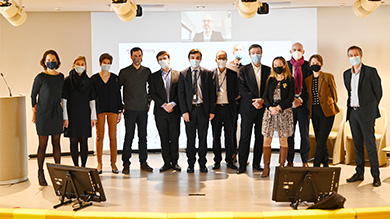Alain Gallois was previously Head of Fixed Income, and then managed Natixis CIB’ Asia-Pacific platform in Hong Kong. He came back to France in May to manage the Investment Banking division at Natixis’ CIB arm, where he currently manages a worldwide team of 300 staff who work across all strategic advisory businesses bar M&A – advisory, financial engineering and market refinancing – for corporates, financial institutions and sovereigns. Here he looks back at the Covid-19 crisis and the first rescue mechanisms that Natixis worked on, and tells us about the mega trends that lie ahead and offer the key to the future recovery.
ALAIN
GALLOIS
Global Head of Coverage and Head of EMEA at Natixis’ Corporate & Investment Banking division and member of the executive committee of Natixis.
The Covid-19 crisis was a huge shock for the market, companies and states. Do you think that the reaction from the French government and from banks was adequate?
The country and the entire planet ground to a near halt in March. This was an extremely stressful situation for companies, as no-one had ever experienced this kind of event, no-one knew where the crisis would lead, and there were real liquidity concerns for both banks and corporations in March and April. The ECB took very swift action and confirmed the roll-out of exceptional measures to ensure liquidity for all market stakeholders, while the French government was also very proactive as it set up state-guaranteed loans (page in French only) in a very short time period.
How did teams at Natixis operate in these circumstances?
Our teams worked flat out for those two months – we set up the first support measures to provide an instant response and address difficulties that companies were facing as they managed the Covid-19 crisis. During this unusual time, we continued to support our clients thanks to input from our IT teams and our Easy program, which facilitated work among our staff and helped us work remotely.
Were massive support programs targeted in the right way?
Groupe BPCE and its subsidiary Natixis were particularly active in supporting our clients via state-guaranteed loans, and this was really the first move in providing assistance for our corporate clients. This very effective French instrument is similar to other mechanisms available in Europe and other countries worldwide. Central banks' moves to swiftly provide the necessary liquidity, governments' efforts to set up ad hoc rescue packages plus the fact that we were able to work almost normally despite lockdown shored up confidence in a particularly challenging situation. These state-guaranteed loans helped companies get through the crisis more readily and roll out exceptional business support measures and programs to protect their staff during this glitch in their business.
What is the impact for companies now?
GDP in France is set to plummet 9% in 2020, which is not as bad as we expected, but it's still the most severe plunge since the Second World War. We swiftly and resolutely supported companies in managing the Covid-19 crisis, either by setting up syndicated credit lines or by assisting them in calling on the market. The bond market was extremely active for corporates and Natixis particularly stood out as we were involved in 8 out of 10 transactions for French corporates, or a market share of 80%.This very challenging market context meant that we worked in very close cooperation with our risk management teams to try to analyze the impact of Covid-19, as we selected clients that we can develop long-lasting and balanced partnerships with.
How can you support them?
Our ability to support our clients is firmly rooted in our identity. Some companies have remained unscathed during the crisis – such as healthcare, tech and food – and have enjoyed very robust growth, while the crisis has meant cashflow issues for others, and our role is to support them with bridging loans for a few months to get through this period. Meanwhile some companies have been very hard hit and structurally damaged by the crisis, or Covid-19 has accelerated their liquidity difficulties, so we ensure that we fully align our commercial policy with our risk policy in these cases. The current situation requires a very close relationship with our clients, built on trust and transparency to provide a clear view of their situation and how it might develop. We can then use our own judgement and implement the right support measures and market products to help them through the current blip, and then support them to recovery. There can be solutions for even the most challenging situations, and our role is to respond with precision to this unique and unprecedented situation, a bit like a master watchmaker.
Is Natixis well prepared to face the situation that lies ahead?
A significant proportion of our business is derived from our traditional domestic market in France where we have the strongest presence – for example we are involved in most bond issues from CAC 40 companies, as well as social bonds such as issues for CADES (a French public administrative agency created for the purpose of repaying social debt) and Unédic (France's unemployment insurance management body). However, the make-up of our revenues is becoming increasingly international, which helps us diversify our income and our risks. Over the past six years, we have worked to expand our business internationally and develop a worldwide network of M&A affiliates, which is positive in the current context. We are able to support our clients in their various transactions, whether buying or selling, increasing stakes, disposals, as well as in all types of financing, both in Europe and worldwide, such as bond issues for the World Bank. Natixis was recently also mandated by Mexico to launch its first green bond issue, where we were sole structurer, despite having a very limited presence in this country. This is testimony to the extent of our green finance expertise, which we have rolled out over the past ten years, with our clients now increasingly taking on board these considerations.
Are any major consolidation trends emerging?
Yes, we expect to see a wave of consolidation both in Europe and worldwide. We think that the strongest companies will emerge in an even stronger position from this crisis as compared with their competitors, even if they may struggle. We are already seeing this trend and the Covid-19 crisis is clearly fueling this tendency. In today's environment, it is crucial for companies to remain adaptable, swift and agile, while here at Natixis, we must continue to listen closely to our clients to offer them the best ideas and solutions.
Natixis is rolling out the mega trends projects, can you tell us more?
We are experiencing an unprecedented crisis, but it is not a liquidity and financial crisis like in 2008 – it is a health crisis that is affecting the entire world economy. This event will not drive major evolutions or revolutions, but rather it is a massive catalyst, fueling trends that already existed, such as green and social. This event will also change our habits and improve trends in healthcare, renewable energy and technology. We are currently looking at the major market trends that will shape our clients' future strategic direction, as it is vital to support them in building their future and pre-empting the social and economic trends that will affect their outlook.
Do you feel optimistic about 2021?
I think that governments, central banks and commercial banks have rolled out the right instruments and taken the right steps to shore up the economy and support companies through this time. So far so good, but a lot of uncertainty still remains i.e. the extent of the second spike in the pandemic, countries' ability to manage this ongoing situation, border closures, uncertainties on the US election coming up in November, etc. These factors all create a lot of volatility and can still trigger stress reactions. We advise our clients to be as proactive as possible to make full use of attractive market conditions (interest rates), while constantly preserving a cash buffer. We think that this approach will help them tackle the situation, as it will take some time for economies to get back to normal. Here at Natixis, we just keep on doing our job – standing beside our clients in the good times and the bad.
















